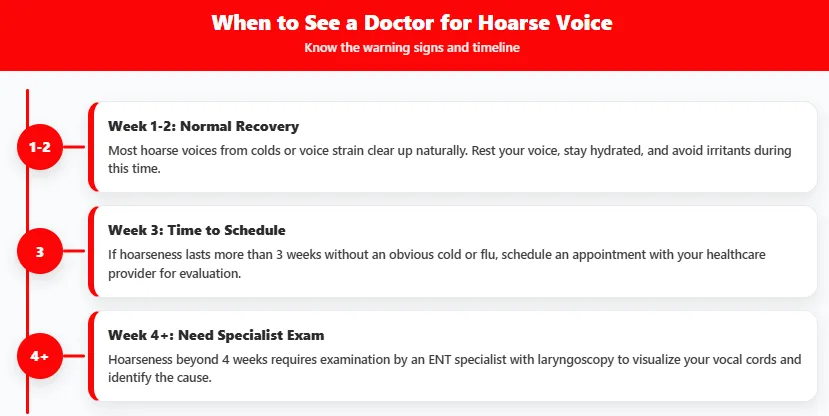

A hoarse voice makes you sound raspy, breathy, or strained. Your volume drops and pitch range shrinks. This happens when your vocal fold becomes inflamed or irritated. Normal vocal cord vibration stops working right.
Most people get hoarse now and then. It’s often harmless. But hoarseness that sticks around can mean something needs attention.
What Causes Hoarseness in Adults?
Laryngitis from Colds and Flu

Laryngitis ranks as the top cause of hoarseness. Your voice box swells up during a throat infection. The flu or a cold triggers inflammation in your vocal fold. Your vocal cords get puffy and can’t vibrate normally.
You’ll likely have other symptoms too. A cough, sore throat, or stuffy nose often show up. Most cases of laryngitis clear up in one to two weeks. Voice rest and water help you heal faster.
Hoarseness lasting more than three weeks needs a doctor’s check. It might not be a simple infection anymore.
Voice Overuse and Strain
Yelling at games, singing loudly, or talking nonstop creates vocal fold strain. Teachers, singers, and call center workers face this daily from voice overuse. The vocal cords swell from all that stress.
Your voice sounds breathy or rough afterward. Rest usually fixes it. But years of abuse can cause vocal cord nodules. These are like calluses on your vocal fold.
Voice fatigue by day’s end signals a problem. Take breaks and use a microphone when speaking to groups.
Acid Reflux and Irritants
Gastroesophageal reflux disease sends stomach acid backward. When acid hits your voice box, it causes laryngopharyngeal reflux. Your voice sounds worse in the morning. You’ll feel the urge to keep throat clearing.
Some people don’t feel heartburn but still have this reflux disorder. Diet changes and medications help manage acid reflux.
Smoking damages your vocal fold badly. It raises your risk for laryngeal cancer too. Chemical fumes and dust are other irritants that harm your voice. Allergies cause postnasal drip that bugs your throat and creates more irritants.
Certain medications affect your voice quality. Asthma inhalers often cause hoarseness. Rinse your mouth after using these medications.
Growths on Vocal Cords
Nodules, polyps, and cysts stop your vocal fold from closing right. Vocal cord nodules form in pairs from chronic strain and poor vocal hygiene. Polyps are softer bumps, often on one side from sudden trauma. Cysts sit deeper in the tissue.
Your voice sounds rough and breathy. Singing becomes harder. Voice therapy helps most cases of nodules and small polyps. Larger growths might need vocal cord surgery.
Laryngeal papillomatosis creates wart-like bumps from HPV. These keep coming back and block your airway. Doctors classify this among airway disorders that need ongoing care.
Nerve and Muscle Problems
Vocal cord paralysis means one or both sides can’t move. Your vocal fold gets stuck open or closed. The cords can’t meet for proper vocal cord closure. Your voice sounds weak and breathy.
Tumors pressing on nerves can cause this problem. Thyroid problems, neck trauma, or surgery might damage these nerves. Neurological disorders like Parkinson’s also affect voice control and create voice disorders.
Muscle tension makes your voice sound strangled. Tight muscles around your voice box create this issue. Stress and poor posture make it worse. Laryngeal massage and voice therapy release the tension.
Health Conditions and Aging
Thyroid disease changes your voice significantly. An underactive thyroid makes you sound deeper and tired. Large thyroid growths press on your vocal cords.
Vocal cord dysplasia shows pre-cancer cell changes from smoking. It usually appears as voice changes that don’t go away. Catching it early prevents one form of cancer from developing.
Cancer anywhere in your throat causes persistent hoarseness. Watch for tumors paired with weight loss or trouble swallowing. Laryngeal cancer often starts with painless voice problems.
Presbylaryngis happens as you age naturally. Your vocal fold loses muscle tone through vocal cord atrophy. This makes your voice soft and breathy. Voice therapy strengthens weak vocal cords.
Dehydration dries out your vocal fold tissue. Drink plenty of water daily. Use a humidifier in dry rooms.
Less Common Causes

Vocal cord hemorrhage happens when blood vessels burst in your vocal fold. Sudden intense screaming can trigger it. You lose your voice completely and need immediate rest.
Vocal cord scarring from intubation or throat disorders stiffens tissue permanently. The scar prevents normal function. This creates ongoing problems that might need more vocal cord scarring treatment. Additional vocal cord scarring from repeated injury makes things worse.
Vocal cord damage from repeated strain affects your ability to speak. Various throat disorders beyond laryngitis need different treatments.
Symptoms That Come With Hoarseness
Your voice quality changes first. You sound raspy, strained, or softer than normal. Other symptoms give clues to the cause.
An infection brings fever and sore throat alongside hoarseness. The flu creates multiple respiratory symptoms at once. Acid reflux creates a bitter taste and lump feeling.
Allergies make your throat itchy and scratchy. Vocal fold growths cause your voice to tire easily. Vocal cord paralysis might make you choke on food.
Pay attention to what else you’re feeling. These signs help doctors find the problem.
When You Need Medical Help

See a doctor if hoarseness lasts more than three weeks. Skip the waiting if you have warning signs.
Get checked immediately for severe throat pain, breathing trouble, or coughing up blood. A lump in your neck or complete voice loss also need quick attention.
Smoking history plus new voice changes demands fast action. Cancer risk goes up with tobacco use and chronic irritation.
Your doctor will ask about your symptoms and habits. A small scope lets them see your vocal fold moving. This exam spots inflammation, nodules, paralysis, or tumors.
Finding the cause early means better treatment options. Tests like scans or biopsies might follow.
Treatment Depends on the Cause
Simple laryngitis needs voice rest and fluids mainly. Stop talking as much as possible. Drink water constantly.
Acid reflux responds to diet changes and medications. Avoid late meals and spicy foods. Quit smoking to remove harmful irritants.
Voice therapy works great for nodules and muscle tension. A speech therapist teaches healthy voice habits. You learn proper breath support and reduce vocal cord damage.
Surgery removes large polyps, cysts, or tumors. Vocal cord surgery helps paralysis cases too. Injections can bulk up a weak vocal fold.
Treating the underlying problem fixes your voice. Thyroid medications help thyroid disease. Managing neurological disorders improves voice control.
Prevention Through Good Habits
Vocal hygiene keeps your voice healthy long term. Stay hydrated all day long. Warm up before heavy voice use.
Don’t yell or whisper for long periods. Both cause strain. Use amplification when speaking to crowds.
Manage your acid reflux with diet and medications. Treat allergies before they irritate your throat. Avoid smoking and limit alcohol.
Rest your voice when it feels tired. Professional voice users should get regular checkups.
How Speech Therapy Helps

Speech therapists specialize in voice problems and voice disorders. They evaluate your vocal fold function and teach better techniques.
Therapy addresses muscle tension, nodules, and post-surgery recovery. You learn exercises for breath support and resonance. Custom programs match your specific needs.
Even vocal cord paralysis improves with dedicated exercises. Conservative therapy often works without surgery. Don’t ignore persistent hoarseness when help is available.
Take action now if your voice has been hoarse for weeks. Schedule an appointment with us. Early treatment prevents permanent vocal cord damage and gets your voice back to normal faster.
Frequently Asked Questions
How long does hoarseness from laryngitis usually last?
Most cases of viral laryngitis clear up within one to two weeks. Voice rest, hydration, and treating the infection help you recover faster.
Can acid reflux cause hoarseness without heartburn?
Yes, laryngopharyngeal reflux often causes chronic hoarseness without typical heartburn symptoms. You might notice worse voice quality in the morning and frequent throat clearing instead.
What’s the difference between vocal cord nodules and polyps?
Nodules are callus-like growths that form in pairs from chronic vocal fold strain. Polyps are softer, blister-like bumps that usually appear on one side, often from sudden trauma like intense shouting.
When is hoarseness a sign of cancer?
Hoarseness lasting more than four weeks needs evaluation, especially with smoking history. Watch for red flags like unexplained weight loss, difficulty swallowing, ear pain, or tumors you can feel in your neck.





